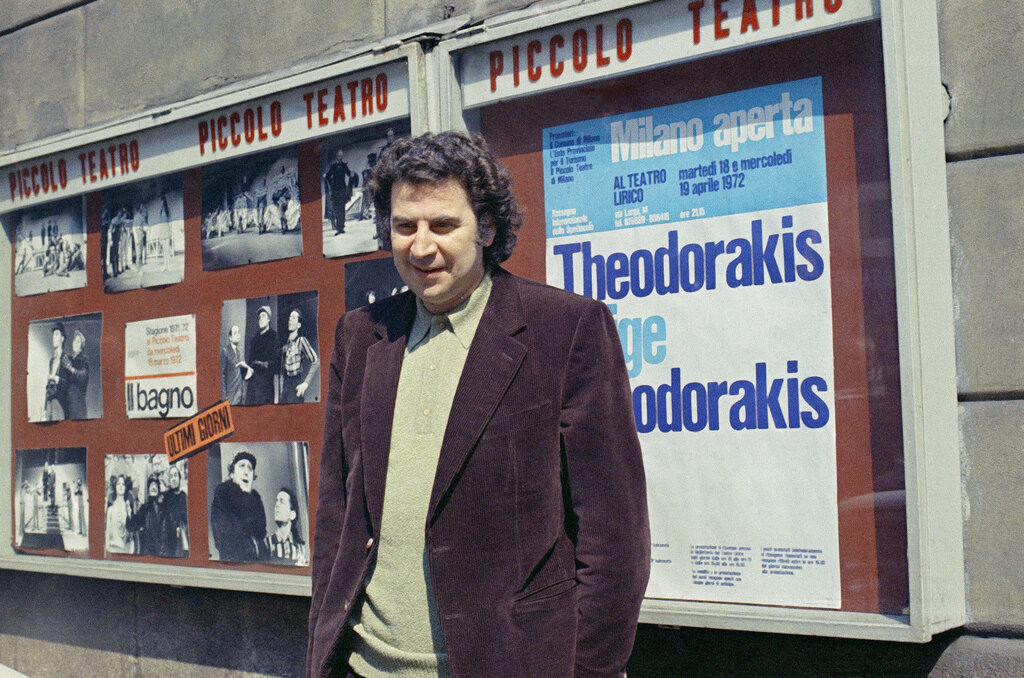Greek veteran composer and political activist Mikis Theodorakis, who was instrumental in raising global awareness of Greece’s plight during the 1967-74 military dictatorship, has died at the age of 96.
Born on the island of Chios, on July 29, 1925, Theodorakis was heavily influenced by music from an early age, being raised with traditional folk music and Byzantine liturgy. Throughout childhood he talked about becoming a composer, and gave his first public concert at the age of seventeen. He went on to study at the Athens Conservatoire and, later, in Paris, under the legendary French composer Olivier Messiaen.
His subsequent work ranged from rousing songs based on major Greek poetic works, many of which became popular anthems of the political left, to symphonies and film scores.
He composed perhaps the most recognizable Greek music internationally, inlcuding the famous “Syrtaki Dance” for the film “Zorba the Greek” (1964), inspired by traditional Cretan dances. The film went on to win three Academy Awards, and Theodorakis’ music became instantly recognizable around the world.
His songs were also performed by famous artists, such as The Beatles, Shirley Bassey and Edith Piaf. He composed the scores in films such as “Z” (1969), which won the BAFTA Prize for original music, “Phaedra” (1962), which included songs with lyrics by Nikos Gatsos, and “Serpiko” (1973), for which he was nominated for a Grammy in 1975 (he claimed the same award for his music “Zorba the Greek” in 1966).
Theodorakis also composed the “Mauthausen Trilogy” — also known as “The Ballad of Mauthausen,” and the “Mauthausen Cantata” — a cycle of four arias with lyrics based on poems written by Greek poet Iakovos Kambanellis, a Mauthausen concentration camp survivor of the Holocaust. The ballad is widely considered as one of Theodorakis’ finest works.
An outspoken political activist throughout his life, Theodorakis joined a reserve unit of ELAS, the military arm of the left-wing National Liberation Front (EAM) during the period of the Greek resistance against Nazi occupation in World War Two, and led a troop in the fight against the right-wing Greek government and allied British forces in the “Dekemvriana” (December 1944-January 1945). During the Greek Civil War he was arrested, sent into exile on the island of Icaria and then deported to the island of Makronisos, where he was repeatedly tortured.

A fierce critic of the far-right military dictatorship in Greece, Theodorakis founded the “Patriotic Front” (PAM) following the junta in 1967. His music was subsequently banned and he was jailed for five months. An international solidarity movement put pressure on the ruling regime, and he was allowed to go into exile in France in 1970.
While in exile, Theodorakis continued his resistance to the regime by giving hundreds of concerts around the world, raising international awareness of the Greek plight and the struggle for the restoration of democracy.
Following the fall of the Colonels in 1974, Theodorakis returned to Greece and continued his musical writing and concert tours, becoming an active and much-respected figure in social and political life. He was passionate about raising awareness of human rights, and was an early campaigner for environmental conservation. A stalwart for peace and reconciliation, he founded the Greek-Turkish Friendship Society with his friend and colleague, Turkish author, musician and poet Zülfü Livaneli.

© AP Photo/Jean-Jacques Levy
Theodorakis had long-standing ties to the Communist Party of Greece, of which he was an MP from 1981 to 1990. However, in 1989 he ran as an independent candidate with the center-right New Democracy Party and became a minister in 1990 under Constantine Mitsotakis, father of the current Greek prime minister, only to resign in March 1992.
He remained active in later life, publishing arrangements of his musical scores and writing articles about culture and politics. He publicly voiced his opposition to NATO’s war in Kosovo (1998-1999) and the American-led invasion of Iraq in 2003.
Among his final set of songs was Odysseia, composed with poetry written by Costas Kartelias, and in 2009 he wrote a Rhapsody for Strings. In later years, he was repeatedly hospitalized due to poor health and in 2019 underwent heart surgery to insert a pacemaker.
Over the course of his remarkable life, Theodorakis wrote over 1,000 scores for orchestral symphonies and opera, and music for theater and cinema. A prodigious talent, he embodied the modern face of Greek music and made it accessible to people all over the world. A hero in his own homeland, he became a symbol of resistance in Greece during the difficult years of the dictatorship, and an enduring symbol of hope and resilience during the more recent period of economic crisis.
In an interview with Reuters, Theodorakis famously said: “I am not a communist or a social democrat or anything. I am a FREE MAN.”











